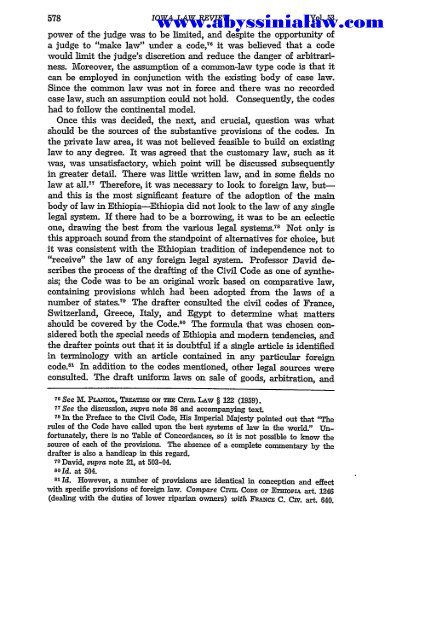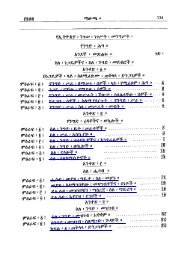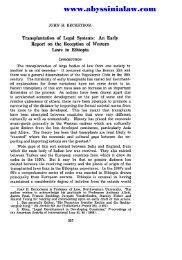Create successful ePaper yourself
Turn your PDF publications into a flip-book with our unique Google optimized e-Paper software.
IOWA LAW REVIEW<br />
power of the judge was to be limited, and despite the opportunity of<br />
a judge to "make law" under a code, 76 it was believed that a code<br />
would limit the judge's discretion and reduce the danger of arbitrariness.<br />
Moreover, the assumption of a common-law type code is that it<br />
can be employed in conjunction with the existing body of case law.<br />
Since the common law was not in force and there was no recorded<br />
case law, such an assumption could not hold. Consequently, the codes<br />
had to follow the continental model.<br />
Once this was decided, the next, and crucial, question was what<br />
should be the sources of the substantive provisions of the codes. In<br />
the private law area, it was not believed feasible to build on existing<br />
law to any degree. It was agreed that the customary law, such as it<br />
was, was unsatisfactory, which point will be discussed subsequently<br />
in greater detail. There was little written law, and in some fields no<br />
law at all. 77 Therefore, it was necessary to look to foreign law, butand<br />
this is the most significant feature of the adoption of the main<br />
body of law in Ethiopia-Ethiopia did not look to the law of any single<br />
legal system. If there had to be a borrowing, it was to be an eclectic<br />
one, drawing the best from the various legal systems." 8 Not only is<br />
this approach sound from the standpoint of alternatives for choice, but<br />
it was consistent with the Ethiopian tradition of independence not to<br />
"receive" the law of any foreign legal system. Professor David describes<br />
the process of the drafting of the Civil Code as one of synthesis;<br />
the Code was to be an original work based on comparative law,<br />
containing provisions which had been adopted from the laws of a<br />
number of states. 79 The drafter consulted the civil codes of France,<br />
Switzerland, Greece, Italy, and Egypt to determine what matters<br />
should be covered by the Code. 80 ['Vol5<br />
www.abyssinialaw.com<br />
The formula that was chosen considered<br />
both the special needs of Ethiopia and modem tendencies, and<br />
the drafter points out that it is doubtful if a single article is identified<br />
in terminology with an article contained in any particular foreign<br />
code.," In addition to the codes mentioned, other legal sources were<br />
consulted. The draft uniform laws on sale of goods, arbitration, and<br />
76 See M. PLAN oL TREATIS. ON THE CIVm LAw § 122 (1959).<br />
77See the discussion, supra note 36 and accompanying text.<br />
78 In the Preface to the Civil Code, His Imperial Majesty pointed out that "The<br />
rules of the Code have called upon the best systems of law in the world." Unfortunately,<br />
there is no Table of Concordances, so it is not possible to know the<br />
source of each of the provisions. The absence of a complete commentary by the<br />
drafter is also a handicap in this regard.<br />
70 David, supra note 21, at 503-04.<br />
80 Id. at 504.<br />
81 Id. However, a number of provisions are identical in conception and effect<br />
with specific provisions of foreign law. Compare CIVrM CODE OF ETmopA art. 1246<br />
(dealing with the duties of lower riparian owners) with FaFcs C. Civ. art. 640.





